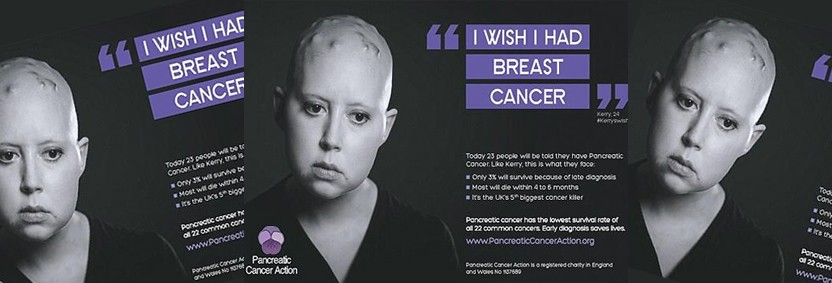UK cancer statistics are frightful and frightening. For every three people who read this article, one will acquire some sort of cancer in their lifetime. The disease doesn't discriminate, striking the very young and the very old, the rich, the poor and the average.
Thankfully, many cancers can now be successfully treated, and survival rates for the breast and testicular varieties are impressive. However, other cancer types are far more aggressive and resistant. One of these is pancreatic cancer. A mere 3% of those affected will live for five years from diagnosis. As you might imagine, the charity Pancreatic Cancer Action (PCA) is battling hard to improve that statistic, which is why they have launched an awareness-raising advertising campaign. And a very controversial campaign it is proving to be.
I must stress that I have no expertise in the treatment or prevention of pancreatic cancer. Indeed, I am only vaguely aware of the pancreas being located between the stomach and my spine. But I do have some experience in charity sector advertising, and was very drawn to this work.
The poster-based campaign, features real people with pancreatic cancer. Alongside their images are large quotations marks, and within those marks "I wish I had breast cancer" (or in the male version "... testicular cancer".
You can see why the campaign has caused a stir.
Then again, that is surely the point. I know charities, quite rightly, attract preferential rates from agencies and media shops - but it would be a shameful waste of a precious marketing budget if the advertising went unnoticed. Thanks to these provocative headlines, pancreatic cancer has achieved a wealth of exposure across radio and TV today. And, of course, has ensured its place in the Creativepool magazine; exactly what third sector marketing is supposed to do. You might argue the work is too blunt, too tasteless or too confrontational - but you cannot argue it is unsuccessful.
In a radio phone-in concerning this campaign, callers suggested PCA are pitching one cancer against another, trying to show pancreatic cancer as somehow 'worse'. I don't agree.
When serious illness crashes its way into the lives of the unsuspecting, everything is about harsh realities. What will happen? When will it happen? What can be done? And beyond these immediate anxieties lie cold, hard facts. Some cancers have undergone more research, have more effective treatments, and offer better outcomes than others. If I were unfortunate enough to be diagnosed with cancer, and it turned out to be one of the less treatable kinds, I would probably wish the same as the people on the posters. I think we all would. In fact, I can't imagine a better way to convey the terrifying nature of pancreatic cancer, than through these headlines.
It's all too tempting to think of charity advertising as soft-focus, weepy and emotional. Actually, it's a very competitive and challenging business. After all, it's tough enough for consumer brands to cut through the marketing noise and persuade the public to spend on things they actually want. To encourage people to notice and support a 'good cause' is demanding indeed. In this arena impact, drama and shock, are as important as emotion, sympathy and appeal. Perhaps more so.
Pancreatic cancer poses an appalling threat, so I'm pleased this work is kicking up a hornets' nest of debate and discomfort. That's how charities gain attention, focus and funding.
This is advertising at its most powerfully human and I wish it all the luck in the world.
http://pancreaticcanceraction.org
Magnus Shaw is a copywriter, blogger and consultant





John Crittenden February 19th, 2014, late at night
I can only tell you that a friend in Kansas, whose own mother died of pancreatic cancer and whose daughter has been near death with breast cancer several times and has been told she can't expect to ever be cancer-free, thinks the campaign is tasteless in the extreme. So cheer on this "hornets' next of debate and discomfort" if you must. I personally think the charity could have gained "attention, focus and funding" by being more humane and less reckless about prompting heartache.